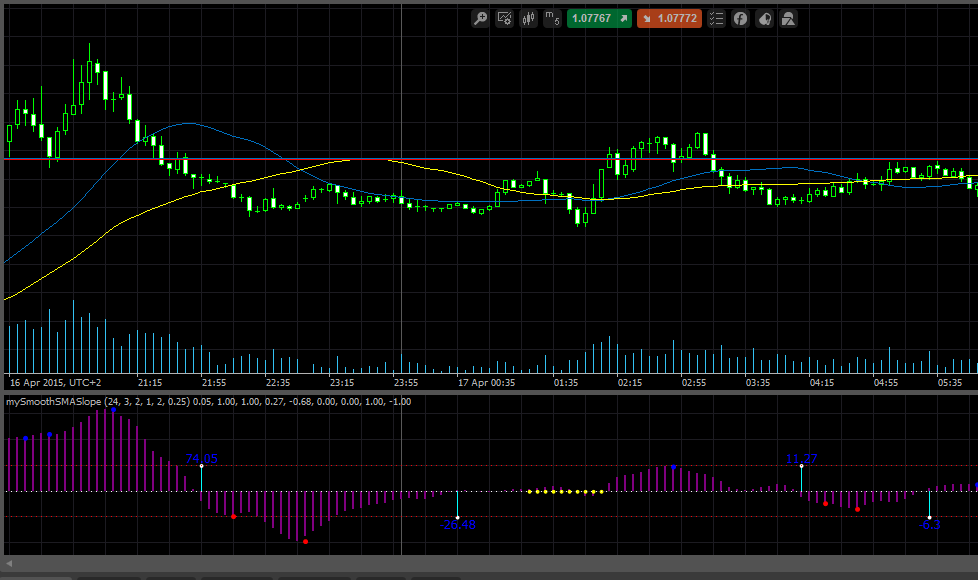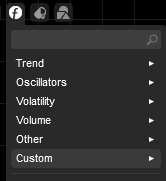Description
My slope indicator calculates the slope of a smoothed SMA. You can enter the backstep, meaning the length of time you want to go back to measure the slope. A slope limit allows you to judge when a threshold is reached for trading. MA tolerance sets a value for the amount of change in the moving average needed to register a peak. Slope peak tolerance sets a minimum value to register a peak in the slope.
The slope indicator registers peaks in the ma and slope. It also gives a signal if the slope is flat for 12 periods.

using System;
using cAlgo.API;
using cAlgo.API.Indicators;
namespace cAlgo.Indicators
{
[Indicator(IsOverlay = false, ScalePrecision = 2, AutoRescale=false)]
public class mySmoothSMASlope : Indicator
{
[Parameter("MAPeriods",DefaultValue = 24)]
public int paramPeriods { get; set; }
[Parameter("MASmoothing",DefaultValue = 3)]
public int paramSmoothing { get; set; }
[Parameter("SlopeBackStep",DefaultValue = 2)] //it take 3 periods to determine a peak
public int paramBackstep { get; set; } //a 3 pip slope has enough momentum to generate a 10 pip reversal
[Parameter("SlopeLimit", DefaultValue = 1)]
public double paramSlopeLimit { get; set; }
[Parameter("MATolerance", DefaultValue = 2)]//MA must reverse greater than this value to register a peak
public double paramMATolerance { get; set; }
[Parameter("SlopePeakTolerance", DefaultValue = .25)]//slope must be greater than this value to register a peak
public double paramSlopePeakTolerance { get; set; }
[Output("Slope", PlotType = PlotType.Histogram, Thickness = 2, Color = Colors.Purple)]
public IndicatorDataSeries Result { get; set; }
[Output("CrossRatio", Color = Colors.Aqua, Thickness = 1, PlotType = PlotType.Histogram)]
public IndicatorDataSeries Xsignal { get; set; }
[Output("CrossRatioPts", Color = Colors.White, Thickness = 3, PlotType = PlotType.Points)]
public IndicatorDataSeries XsignalPoints { get; set; }
[Output("Peak", PlotType = PlotType.Points, Thickness = 4, Color = Colors.Blue)]
public IndicatorDataSeries Peak { get; set; }
[Output("Valley", PlotType = PlotType.Points, Thickness = 4, Color = Colors.Red)]
public IndicatorDataSeries Valley { get; set; }
[Output("FlatSignal", Color = Colors.Yellow, Thickness = 3, PlotType = PlotType.Points)]
public IndicatorDataSeries FlatSignal { get; set; }
[Output("Center", LineStyle=LineStyle.DotsRare, Color = Colors.White)]
public IndicatorDataSeries CenterLine { get; set; }
[Output("UpperLimit", PlotType = PlotType.Line, LineStyle=LineStyle.DotsRare,Thickness = 1, Color = Colors.Red)]
public IndicatorDataSeries UpperLimit { get; set; }
[Output("LowerLimit", PlotType = PlotType.Line, LineStyle=LineStyle.DotsRare, Thickness = 1, Color = Colors.Red)]
public IndicatorDataSeries LowerLimit { get; set; }
private mySmoothSMA MA;
double LastSlopePeak;
double LastSlopeValley;
double LastPeakMA;
double LastPeakClose;
int PeakCount;
protected override void Initialize()
{
string IndicatorName = GetType().ToString().Substring(GetType().ToString().LastIndexOf('.') + 1);// returns ClassName
Print("Indicator: "+IndicatorName);
Print("IndicatorTimeZone: {0} Offset: {1} DST: {2}", TimeZone, TimeZone.BaseUtcOffset, TimeZone.SupportsDaylightSavingTime);
PeakCount=0;
LastSlopePeak=paramSlopePeakTolerance;
LastSlopeValley=-paramSlopePeakTolerance;
LastPeakClose=0;
MA = Indicators.GetIndicator<mySmoothSMA>(MarketSeries.Close,paramPeriods,paramSmoothing);
}
public override void Calculate(int index)
{
int t0 = index;
int t1 = t0 - 1;
int t2 = t1 - 1;
int t3 = t2 - 1;
int tb = t0 - paramBackstep;
double MADiff;
double CloseDiff;
if(tb<0)return;//** prevent crash caused by posibly using a negetive index value
if(double.IsNaN(MA.Result[tb]))return; //** skip printing bar until moving average data is calculated
double close0 = MarketSeries.Close[t0];
decimal MAt0 = (decimal) MA.Result[t0];
decimal MAtb = (decimal) MA.Result[tb];
decimal maslope0 = decimal.Round((MAt0-MAtb)/((decimal)Symbol.PipSize*paramBackstep),2);
//Print("{0,20}{1,20}{2,20}{3,20}",MarketSeries.OpenTime[t0].AddHours(2).ToString("MM/dd/yyyy HH:mm"),MAt0, MAt1,maslope0);
Result[index]= (double)(maslope0);
int i=1;
double divisor;
while(Result[index-i]==0){i++;}
divisor=Result[index-i];
double SlopeRatio=Math.Round(Result[index]/divisor,2);
if(SlopeRatio<0)
{
MADiff=Math.Round((MA.Result[t0]-LastPeakMA)/Symbol.PipSize,2);
CloseDiff=LastPeakClose!=0?Math.Round((MarketSeries.Close[index]-LastPeakClose)/Symbol.PipSize,2):0;
if (MADiff<-paramMATolerance || MADiff>paramMATolerance || double.IsNaN(MADiff))
{
Xsignal[index]=Result[index]>0?-paramSlopeLimit:paramSlopeLimit;
XsignalPoints[index]=Xsignal[index];
LastSlopePeak=paramSlopePeakTolerance; //Reset after a peak
LastSlopeValley=-paramSlopePeakTolerance;
LastPeakClose=close0; //set the closing price at the last MA peak
LastPeakMA=(double)(MAt0); //set the last MA peak
PeakCount++;
//Print("PeakCount: "+PeakCount); //for testing
ChartObjects.DrawText("MADiffs" + index, Convert.ToString(MADiff), index, Xsignal[index], Result[index]<=0?VerticalAlignment.Top:VerticalAlignment.Bottom, HorizontalAlignment.Center, Colors.Blue);
//ChartObjects.DrawText("CloseDiffs" + index, Convert.ToString(CloseDiff), index, Xsignal[index], Result[index]<=0?VerticalAlignment.Top:VerticalAlignment.Bottom, HorizontalAlignment.Center, Colors.Red);
}
}
if(Result[t1]>LastSlopePeak && ((Result[t3]<Result[t2] && Result[t2]==Result[t1]) || Result[t2]<Result[t1]) && Result[t1]>Result[index])
{Peak[index]=Result[t1];// Set a peak
LastSlopePeak=Result[t1];}
if(Result[t1]<LastSlopeValley && ((Result[t3]>Result[t2] && Result[t2]==Result[t1]) || Result[t2]>Result[t1]) && Result[t1]<Result[index])
{Valley[index]=Result[t1];// Set a valley
LastSlopeValley=Result[t1];}
if(Result.Maximum(12)<paramSlopePeakTolerance && Result.Minimum(12)>-paramSlopePeakTolerance)
FlatSignal[index]=0;
UpperLimit[index]=paramSlopeLimit;
LowerLimit[index]=-paramSlopeLimit;
CenterLine[index]=0;
}
}
}
lec0456
Joined on 14.11.2012
- Distribution: Free
- Language: C#
- Trading platform: cTrader Automate
- File name: mySmoothSMASlope.algo
- Rating: 0
- Installs: 4398
- Modified: 13/10/2021 09:54
Comments
how it is possible to use your indicator on Cbot ?
Sure, its just a sma wit an sma applied to it. It removes some of the choppyness between close periods.
using System;
using cAlgo.API;
using cAlgo.API.Internals;
using cAlgo.API.Indicators;
using cAlgo.Indicators;
namespace cAlgo
{
[Indicator(IsOverlay = true, ScalePrecision = 7,TimeZone = TimeZones.UTC, AccessRights = AccessRights.None)]
public class mySmoothSMA : Indicator
{
[Parameter()]
public DataSeries Source { get; set; }
[Parameter(DefaultValue = 24)]
public int paramPeriods { get; set; }
[Parameter(DefaultValue = 3)]
public int paramSmoothing { get; set; }
[Output("SMA", Color = Colors.Red)]
public IndicatorDataSeries Result { get; set; }
private SimpleMovingAverage sma;
private SimpleMovingAverage smoothsma;
protected override void Initialize()
{sma = Indicators.SimpleMovingAverage(Source, paramPeriods);
smoothsma = Indicators.SimpleMovingAverage(sma.Result, paramSmoothing);}
public override void Calculate(int index){ Result[index] = smoothsma.Result[index];}
}
}
Could provide the custom indicator mySmoothSMA ?

I was trying to build button, but error occurred.
My smooth SMA.csproj doesn't exist.
How can I solve this ?